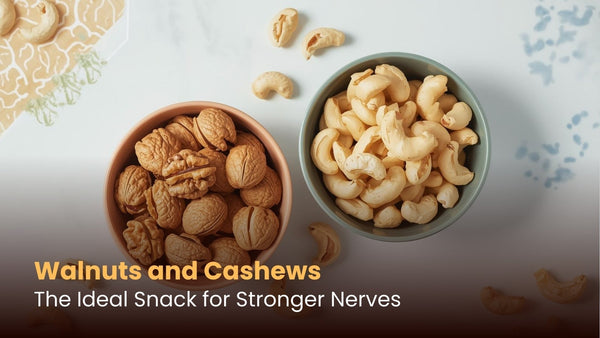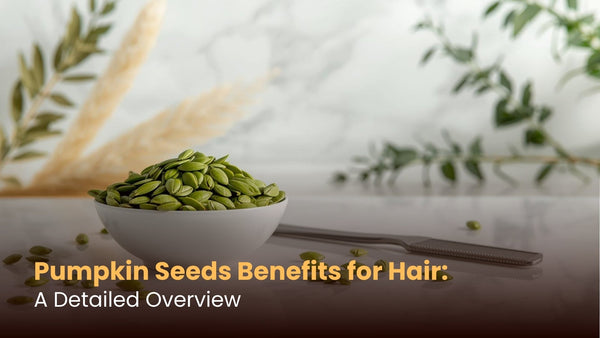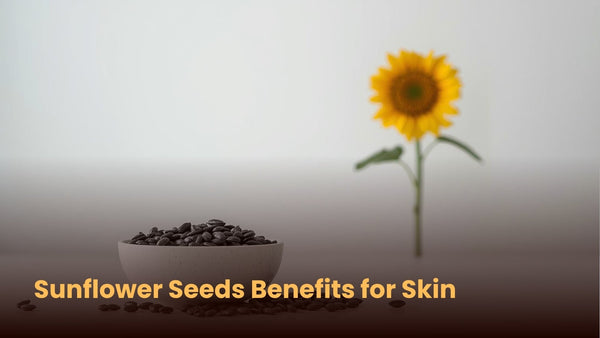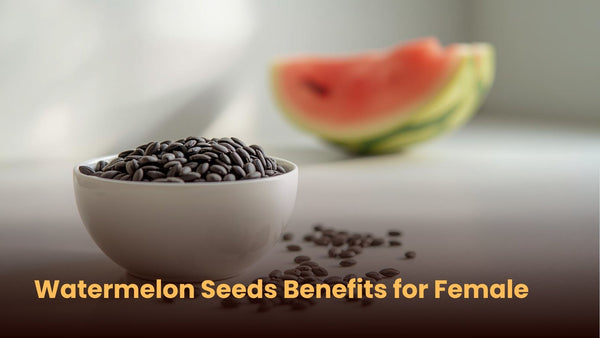Sunflower seeds are like little nutritional powerhouses packed with benefits for your skin. Loaded with vitamin E, antioxidants, and essential fatty acids, they work wonders in protecting your skin from free radical damage, calming inflammation, and keeping it hydrated. The zinc found in these seeds is significant for skin repair and collagen production, which can improve your skin's elasticity and firmness. When you include sunflower seeds in your diet regularly, you might notice a natural glow, better protection against UV damage, and a slowdown in premature ageing. So, adding sunflower seeds to your meals is an easy and natural way to nourish and rejuvenate your skin from the inside out.
Table of Contents
- Introduction
- Key Nutritional Components of Sunflower Seeds for Skin
- Sunflower Seeds Benefits for Skin
- Antioxidant Protection
- Enhanced Hydration
- Reduction of Inflammation and Redness
- Collagen Synthesis and Skin Elasticity
- Skin Repair and Regeneration
- Protection Against UV Damage
- Treatment and Prevention of Acne
- Support for Even Skin Tone
- Skin Barrier Reinforcement
- Glow and Radiance
- Conclusion
- Frequently Asked Questions
Key Nutritional Components of Sunflower Seeds for Skin
When it comes to nutritional composition, sunflower seeds have a lot to offer.
- Vitamin E is a powerful antioxidant that’s vital for maintaining healthy skin. It bolsters the skin barrier, offering protection against environmental damage such as UV rays and pollution. By combating free radicals, vitamin E helps to minimise inflammation, prevent early signs of ageing, and promote a radiant, hydrated look.
- Healthy skin relies on omega-3 and omega-6 fatty acids, which are vital for its maintenance. They help lock in moisture by reinforcing the skin’s lipid barrier, which prevents dryness and dehydration. These beneficial fats also boost elasticity by aiding collagen production, reducing inflammation, and helping regulate oil production, resulting in softer, smoother, and more youthful-looking skin.
- Selenium, zinc, and magnesium are essential minerals that play a key role in skin healing and regeneration. Selenium is a potent antioxidant that helps protect skin cells from damage. Zinc is beneficial for wound healing and boosting collagen production. Magnesium keeps the skin hydrated and supports the repair of the skin barrier, all of which contribute to healthy, resilient skin.
Sunflower Seeds Benefits for Skin
Sunflower seeds have a range of nutrients, and many of them are beneficial for the skin. Here are the key benefits they offer:
Antioxidant Protection
Vitamin E found in sunflower seeds is a fantastic antioxidant that fights off free radicals, helping to shield your skin cells from damage and keep that youthful, radiant glow. This antioxidant powerhouse not only reduces the signs of ageing but also promotes skin repair and boosts overall skin health, making sunflower seeds a fantastic natural ally. By incorporating these seeds into your daily diet, you can enjoy a vibrant, glowing complexion while combating environmental stressors. Their vitamin E content also supports skin moisture and elasticity, contributing to a smooth, healthy texture over time.
Enhanced Hydration
Sunflower seeds are abundant with essential fatty acids, particularly linoleic acid, which helps to strengthen the skin’s natural moisture barrier. This barrier is crucial for locking in hydration, keeping dryness and flakiness at bay, and ensuring your skin feels soft and smooth. By nourishing your skin from the inside out, sunflower seeds can give you a plump, hydrated complexion that radiates vibrancy. So, adding sunflower seeds to your meals is a simple and effective way to keep your skin moisturised and resilient against environmental stressors.
Reduction of Inflammation and Redness
Sunflower seeds are plentiful in potent anti-inflammatory properties thanks to nutrients like vitamin E, selenium, and flavonoids. These elements work wonders for irritated skin, helping to ease redness and discomfort. By reducing inflammation and swelling, they can really benefit sensitive or acne-prone skin. Whether you consume them regularly or apply sunflower seed oil topically, you can naturally achieve a clearer, calmer, and more even-toned complexion. Their gentle effects also support skin healing and can help with conditions like acne, eczema, and rosacea, making sunflower seeds an ideal addition to any skincare routine focused on reducing inflammation and enhancing overall skin comfort.
Collagen Synthesis and Skin Elasticity
Sunflower seeds are a powerhouse for boosting collagen synthesis and improving skin elasticity, thanks to their rich content of zinc and omega-6 fatty acids. Zinc is vital for collagen formation, which keeps your skin looking firm and supple, while omega-6 fatty acids help lock in moisture and maintain skin flexibility. Snacking on sunflower seeds can boost your skin's health, making it smoother and more resilient. By feeding your skin from the inside out, these little seeds can help slow down those annoying signs of ageing and keep your skin looking naturally firm.
Skin Repair and Regeneration
Sunflower seeds are a great way to support your skin's repair and regeneration processes. Their impressive zinc content plays a vital role in collagen synthesis, which expedites tissue repair and enhances your skin's overall texture. Plus, the vitamin E and antioxidants in these seeds protect damaged cells, reduce inflammation, and promote healing, resulting in smoother and healthier skin. When you make sunflower seeds a regular part of your diet, you're achieving a glowing complexion while boosting its resilience against environmental damage. The combination of nutrients in sunflower seeds makes them a fantastic natural partner for ongoing skin repair and regeneration.
Protection Against UV Damage
Sunflower seeds are a treasure trove of vitamin E and beta-carotene, both of which are potent antioxidants that help protect your skin from those pesky UV rays. They serve as internal protectors, tackling free radicals that result from sun exposure and calming skin sensitivity. While they shouldn't replace sunscreen, they do a great job of supporting your sun protection efforts by boosting your skin's resilience and repair, leading to a healthier, more youthful look. By regularly incorporating sunflower seeds into your diet, you can support your skin's defence against sun-induced damage and maintain its natural glow and vibrancy over time.
Treatment and Prevention of Acne
Sunflower seeds are more than just a tasty snack; they can also be a great help in treating and preventing acne. They work by regulating sebum production, which helps control the excess oil that can clog pores and lead to breakouts. Thanks to their anti-inflammatory properties, courtesy of vitamin E and selenium, they can soothe the redness and irritation that often accompany acne. With their high zinc content, sunflower seeds support the healing of blemishes by aiding in collagen production and skin repair. The antioxidants in these seeds also play a protective role against free radical damage, helping to reduce inflammation and promote clearer, healthier skin.
Support for Even Skin Tone
Sunflower seeds are fantastic for helping you achieve a more even skin tone and fading those pesky dark spots. It is all thanks to their impressive antioxidant content, which includes vitamin E and beta-carotene. These powerful antioxidants work to combat oxidative stress and reduce melanin production, which is often the reason behind pigmentation issues and uneven skin tone. By neutralising free radicals, sunflower seeds aid in skin regeneration and can naturally brighten your complexion. Their essential fatty acids boost the skin's barrier function, keeping it hydrated and promoting a smooth, radiant look. Snacking on these seeds can help calm inflammation, reduce redness, and support the gradual fading of dark spots.
Skin Barrier Reinforcement
Sunflower seeds are brimming with nutrients that help strengthen your skin's natural moisture barrier, ensuring it remains resilient over time. Their notable linoleic acid content is key to fortifying this barrier, preventing moisture loss, and keeping your skin hydrated, soft, and supple. This protective layer also helps guard against environmental pollutants and dryness, reducing irritation and flakiness. Furthermore, the vitamin E and antioxidants present in sunflower seeds contribute to maintaining the integrity of the barrier by protecting skin cells from damage and the effects of ageing. By incorporating sunflower seeds into your diet or using sunflower seed oil, you can enhance your skin's texture and strength.
Glow and Radiance
Sunflower seeds are a fantastic way to achieve the natural glow and radiant skin we all desire, thanks to their special mix of nutrients. Packed with vitamin E, they work hard to fight off free radicals that can lead to premature ageing and a lacklustre complexion. The omega-3 and omega-6 fatty acids in these little seeds do wonders for hydration, keeping your skin moisturised and soft. Plus, they boost circulation, which helps promote a clearer complexion and encourages healthy skin cell renewal. With their powerful antioxidants and healthy fats, sunflower seeds can help reduce inflammation and smooth out any rough texture, giving you that youthful, vibrant appearance.
Conclusion
Sunflower seeds are like little treasures for your skin, packed with benefits that can help you achieve that healthy, radiant glow. Loaded with vitamin E, antioxidants, and essential fatty acids, they shield your skin from free radical damage and strengthen your skin’s moisture barrier. These nutrients are necessary for collagen production, which helps improve your skin’s elasticity and firmness while also supporting repair and regeneration. Additionally, sunflower seeds can help reduce inflammation and regulate oil production, making them an excellent choice for anyone dealing with acne-prone skin. In short, sunflower seeds nourish your skin from the inside out, promoting a youthful, glowing complexion and long-lasting skin resilience.
Frequently Asked Questions
How do sunflower seeds benefit skin health?
Sunflower seeds are amazing for your skin. Bursting with vitamin E and antioxidants, they offer protection against damage and help maintain hydration. The zinc they contain is great for healing blemishes, and the fatty acids play a key role in fortifying your skin’s barrier to prevent dryness.
Can sunflower seeds help with dry or flaky skin?
Sunflower seeds can help with dry or flaky skin. They’re rich in essential fatty acids and vitamin E, which deeply moisturise and nourish your skin. These nutrients work to strengthen your skin’s natural barrier, locking in moisture and preventing dryness and flakiness. The outcome is beautifully soft, smooth, and hydrated skin.
Are sunflower seeds effective for acne-prone or inflamed skin?
When it comes to sunflower seeds and their effect on acne-prone or inflamed skin, the results are varied. These seeds are excellent for their anti-inflammatory and antioxidant properties, which can help support healing. However, some research suggests that munching on sunflower seeds may actually exacerbate acne due to their high omega-6 fatty acid content, which can lead to inflammation.
Do sunflower seeds prevent premature ageing?
Sunflower seeds are fantastic for keeping the signs of ageing at bay. Loaded with vitamin E and antioxidants, they help shield your skin from damage caused by free radicals, which can lead to wrinkles and fine lines. The nutrients in these seeds also promote collagen production, helping your skin stay firm and elastic.
Can sunflower seeds fade dark spots or even skin tone?
Sunflower seeds can be a fantastic ally in achieving an even skin tone and may help to fade dark spots. They're plentiful in antioxidants, especially vitamin E, which helps protect your skin from damage, ease inflammation, and support cell repair. While they won't directly treat pigmentation, the nutrients they offer can contribute to a brighter and healthier complexion over time.
Do sunflower seeds have a role in UV protection?
Absolutely, sunflower seeds can be beneficial for UV protection. They’re rich in vitamin E and beta-carotene, which are potent antioxidants that help combat harmful UV rays and environmental stressors. While they shouldn’t replace your sunscreen, they do bolster your skin’s natural defences, aiding in the reduction of sun damage and promoting a healthy, glowing complexion.
Is sunflower seed oil good for skin health?
When it comes to skin health, sunflower seed oil is truly a gem. It hydrates deeply without causing pore congestion, fortifies the skin barrier, and alleviates irritation. With its abundance of vitamin E and antioxidants, it slows down the ageing process. Plus, its lightweight and nourishing properties help you achieve that soft, smooth, and radiant complexion you desire.
How can sunflower seeds support wound healing or skin repair?
Sunflower seeds are amazing for healing wounds and rejuvenating skin. They’re abundant with essential fatty acids and antioxidants that help reduce inflammation and promote tissue regeneration. Sunflower seed oil accelerates the healing process by enhancing wound contraction and boosting collagen production. Its antimicrobial properties are also vital in preventing infections, allowing your skin to recover more quickly.
How should sunflower seeds be consumed or used for skin benefits?
If you want to give your skin a little love, sunflower seeds are a great choice. Snack on them or sprinkle them over salads and smoothies for a nutritious kick. You can also use cold-pressed sunflower seed oil as a lightweight moisturiser on damp skin or mix it into your lotions.
Are there any risks or side effects of using sunflower seeds for skin?
Sunflower seeds and oil are usually safe for your skin, but they can trigger allergies in some people, particularly those who are sensitive to ragweed or similar plants. If you have oily skin, using too much might clog your pores. It’s always a good idea to check with a doctor if you experience any allergic reactions or irritation.











Share Your Thoughts